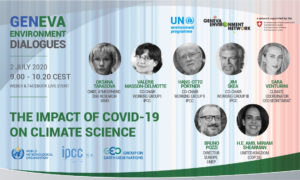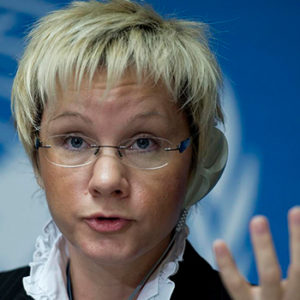Event Virtual
GENeva Environment Dialogues | The Impact of COVID-19 on Climate Science

02 Jul 2020
09:00–10:20
Venue: Live | Webex Event & Facebook
Organization: Geneva Environment Network
This session of the GENeva Environment Dialogues, co-organized with the World Meteorological Organization, the Intergovernmental Panel on Climate Change and the Group on Earth Observations, addressed the impacts of the COVID-19 pandemic on climate science.
About the GENeva Environment Dialogues
The GENeva Environment Dialogues’ special COVID-19 series discusses the impacts of the pandemic on the global environmental agenda. Experts are concerned that the world is losing critical time to turn around alarming trends in biodiversity loss, climate change, sound management of chemicals and other environmental threats.
The series addresses the following topics:
- The impact of the crisis on the invited organization activities
- The response of the invited organization to the COVID-19 crisis
- The impacts on the preparations of the conferences and negotiations they are hosting
- New schedules and programmes for these conferences and negotiations
Impact of COVID-19 on Climate Science
The pandemic has affected the activities of scientific institutions and government agencies worldwide, leading to a reduced productivity in some programs and gaps in long-term climate data. The World Meteorological Organization (WMO) was among the first organization to express concerns about our planet’s observation system. Due to the disruption in scientific work and the cancellation of conferences caused by the pandemic, the extension to the literature cut-off date has been implemented and the Lead Author meetings of reports of the Intergovernmental Panel on Climate Change (IPCC) have been postponed. It is now essential to focus on leveraging scientific support and knowledge-sharing for a sustainable recovery.
Lockdown and related measures implemented by countries to limit the spread of COVID-19 have led to a decrease in economic activities and a drop in road transport, temporarily cleaning skies and decreasing levels of certain air pollutants. However, carbon dioxide remains in the atmosphere and oceans for centuries. The scientific community reminds us continuously that the world needs to be committed to continued efforts in climate change regardless of any temporary decrease in emissions due to the pandemic. Researchers have also found that air pollution might have intensified the pandemic.
Speakers
Facilitation: GEN Team

Bruno Pozzi
Director, Europe, UNEP

Oksana Tarasova
Chief, Atmospheric Environment Research Division, WMO

Valérie Masson-Delmotte
Working Group I Co-Chair, IPCC

Hans-Otto Pörtner
Working Group II Co-Chair, IPCC

Jim Skea
Working Group III Co-Chair, IPCC

Sara Venturini
Climate Coordinator, GEO Secretariat

H.E. Amb. Miriam Shearman
Deputy Permanent Representative, Permanent Mission of the UK to the UN and other International Organisations
Summary
Welcome
Moderation: Diana Rizzolio, Geneva Environment Network
- The COVID-19 pandemic is a health crisis that has affected everyone, and that has an important economic impact on top of the human suffering caused by the disease itself.
- There is a large response from the UN system and from other actors to this crisis, including on the global environmental agenda, as we have heard in the sessions we have convened, and will hear this morning.
- The Secretary General of the United Nations refers to the COVID-19 pandemic as “an unprecedented wake-up call”. The pandemic has resulted in major economic and political shifts around the globe which are giving the international community a unique window of opportunity in which recovery plans can be instrumental in creating a more sustainable and resilient future.
- As we recover, we must build back better for people and for the planet.
- The Secretary General keeps also reminding us that we have a framework for action – the 2030 Agenda for Sustainable Development and the Paris Agreement on Climate Change.
- Today we have invited you to join us to discuss the impact of the pandemic on climate science, with leading experts from the climate science community.
- In Geneva all the international community is engaged in taking action to combat climate change and its impacts, thus supporting the implementation of sustainable goal 13 as well as the Paris Agreement.
- In all negotiations taking place here, this being human rights, world of work, health,
disasters reduction, migration, humanitarian, intellectual property and many more, tackling climate change is part of the conversation and decision. And in these fora the work, the reports and other tools issued by the organizations that we have invited to join us this morning really matters, as it does for many more. - Last month, during the June momentum for climate change event organized by UNFCCC, a first discussion on the impacts of the pandemic on climate science took place. Some of the guests that have joined us today took part in that event and engaged with us in continuing the conversation as there is really appetite from many stakeholders to hear and learn more on this topic.
- The world meteorological organization, UNESCO and others have issues news releases on this thematic.
- We have prepared this session with tree leading institutions that are based in Geneva:
- The World Meteorological Organization, the UN system’s voice on the state and behavior of the Earth’s atmosphere, its interaction with the oceans, the climate it produces and the resulting distribution of water resources.
- The Intergovernmental Panel on Climate Change, which is the United Nations body for assessing the science related to climate change.
- The secretariat of the Group on Earth Observation, leading on coordinating earth observations and the development of a Global Earth Observation System of Systems.
- We have also the pleasure to welcome again for this live session the deputy permanent representative of the United Kingdom to the United Nations institutions in Geneva, leading the work of the mission on the preparations for the climate conference scheduled to take place in Glasgow next year and championing in making links with all the multilateral processes ongoing in Geneva.
Opening remarks
Bruno Pozzi, Director, UNEP Europe Office
- One of the things that COVID-19 demonstrated is that science is central
- For UNEP science is essential – science-driven, data-driven organization
- Use science to give options on policy
- COVID-19 gives us an opportunity to put science at the centre
- The pandemic disrupted a lot of activities, including science
- Budgets might be affected as well
- Give decision-makers options to face the emergencies of
- Biodiversity loss
- Climate change
- Pollution
Impacts of COVID-19 on climate science
Oksana Tarasova, Chief, Atmospheric Environment Research, WMO
- COVID-19 impacts on the observational infrastructure, on the state of the environment and on climate research
- All good science starts from evidence
- Most evidence in climate science are coming from observation
- WMO supports the observation of our meteorological parameters and this system consists of several components (measuring from air, ground and satellites, for instance) that are compiled together to give a comprehensive view of climate
- During COVID-19, aerial observations, that measure pressure and temperatures, declined – information flow declined, leading to a decline it the accuracy of regional forecasts
- Some countries are still running the manual measurement of meteorology – measures so not take place and the quality of meteorological monitoring sharply declines
- Same observing systems are used to find out the drivers of climate change (Global Atmosphere Watch Programme)
- Despite the measures taken to confine the pandemic and the associated emissions reductions – we do not see a decrease in concentration:
- CO2 is a long-lived gas
- All the accumulated emissions in the atmosphere since the pre-industrial time do not let the concentration decrease
- Observatories in Australia and Hawai’I show an increasing trend of concentration
- Driven by the terrestrial biosphere
- Lockdown measures could lead to an impact on the growth rate of concentration of maximum 0,2 ppm (part per million)
- In the last 10 years, changes in the growth rate of concentration are between 2 and 3 ppm – a 0,2 ppm change is very difficult to measure
- Measures taken during COVID-19 are not the substitution for long-term measures
- There has been an emission reduction
- Integrated Carbon Observing System (ICOS) in Europe shows patterns of emission reduction in cities
- Can be clearly seen by its impact on air pollution
- In the case of short-lived pollutants, such as NO2, we can see there is a direct connection between lockdown measures and a reduction in emissions
- Pollution episodes associated with specific meteorogical condition still present
- Lesson learned looking at those datasets:
- We need really good science, observing systems and modelling systems to study the policies and their effects
- Connection between climate and COVID-19 spread
- The first publications and assessments made a simple correlation between temperatures and the number of COVID-19 cases – those analyses are not reliable
- Growing evidence of the link between risk of death because of COVID-19 and exposure to polluted/dirty air
- Peer-reviewed publications demonstrate that there is no direct influence of climate on the spread of COVID-19
- Peer-reviewed publications demonstrate that there is indirect relation between COVID-19 and climate
- Socio-economic impacts of the pandemic increase vulnerability to climate extremes
- Environmental conditions might aggravate symptoms (ex. Air pollution)
- Co-morbidities of other climate-sensitive diseases
- Weather alters human behaviours that might lead to more transmission
- Joint WHO/WMO Task Team to coordinate and review potential climate-related risks of COVID-19
- WMO Symposium on “Climatological, Meteorogical and Environmental factors in the COVID-19 pandemic” – 4-6 August 2020
Valérie Masson-Delmotte, Co-chair, Working Group I, IPCC
- 6th Assessment cycle of the IPCC
- 3 special reports published in 2018-2019, now in preparation for the main WG report on the “Physical science basis”
- New report: completely new outline
- Assessing state of knowledge based on the assessment of scientific literature
- Large-scale climate change – What is observed? How does it compare with natural variations? What is the influence of human activities on the global climate system? What can we anticipate in short-term predictability and long-term projections?
- Assessment of fundamental mechanisms affecting the global and regional climate change characteristics
- Pandemic affected work of the WG
- Any effect on preparation steps has impacts on the final delivery of the report
- Review process of drafts – provide critical comments
- WGI: Second Order Draft Review started on 2 March and pandemic declared on 11 March
- Survey of focal points and of the broader climate community
- Decision on extension of Review period and on the postponement of LAM4
- More than 50.000 review comments – 60% more than for the 5th Assessment Report
- Running virtual activities – consider insights, coordination across chapters and prepare revision of chapters
- Current work schedule is built assuming that the WGI approval plenary can take place in July 2021
- Feedbacks from the virtual activities:
- As inclusive and participatory as in-person meetings
- Difficult to deal with different time zones, but recorded and repeated sessions facilitated that
- In-person interaction missing
- Limit on number of daily meetings and on their duration
- Mixture of formats and interaction types appreciated
- Late stage of report preparation
- Assess the scientific publications on the temporary effects of the pandemic on emissions
- Assess literature on when and how we will be able to perceive the effect of ambitious mitigation and reduction of emissions
Hans-Otto Pörtner, Co-chair, Working Group II, IPCC
- IPCC WGII focuses on the impacts of climate change on human societies and ecosystems, and on the possibilities of these systems to adapt to climate change
- Very fine-tuned process of production of reports, as a consequence, the pandemic has struck each WG at different times – the WGII moving in the production of the Second Order Draft
- Extension by about 4 months of the production phase of the Second Order Draft – shifting of deadlines and of the 4th LAM
- IPBES and IPCC Expert Workshop on the Impact of Climate Change on Biodiversity – planned for May 2020, postponed
- COVID-19 is triggering new questions for us as a society and for the scientific community:
- Relation between human health, biodiversity and climate
- Climate change impact on biodiversity
- Climate change is endangering species – this depends on the severity of the increase
- According to the IPCC Special Report “1.5°”
- To keep these risks at the lowest level we need to limit temperature increases to below 1.5°
- If we continue on current trends, we are headed towards +4° of increase, which would affect more than 20% of all species, especially in the tropics
- Increased exposure to and exploitation of wildlife, which increases the likelihood of diseases jumping species
- Climate change will further affect animal distribution
- New aspects to be consider in the WGII report to be finalizes, approved in 2022
Jim Skea, Co-chair, Working Group III, IPCC
- Things are moving very quickly in WGIII
- On the process of WGIII:
- Before lockdown, WGIII was about to organize the LAM in Quito
- Organized a virtual meeting in mid-April
- Modify ambitions downwards – emphasis on crosscutting issues rather than specific chapters
- Meeting exceeding people expectations
- Report on outcomes of meeting in terms of both scientific and logistic aspects
- Some elements were extremely successful – wider range of inputs
- Negative – much slower process on individual chapters
- Other aspects – saved carbon emissions (368 tonnes of CO2) + developing countries authors’ well-being improved (no need to travel to a far-flung location)
- Not announced changes to schedule
- Review with authors on prospects in sticking to schedule
- Approval schedule for September 2021 would require heroic efforts
- Complex decision-making process
- On the substance of WGIII:
- COVID-19 is having an impact on emissions and climate change mitigation policies
- WGIII scope includes a coverage of COVID-19
- LAM – breakout group discussing approach to COVID-19
- We can cover specific topics in WGIII depending on literature available:
- Link between climate change mitigation, green economy and COVID-19
- Impacts on emissions – will trends keep constant or be back at the same as before
- COVID-19 exacerbated existing inequalities
- Types of literature – more op-eds and advocacy pieces, we need evidence-based literature
- Chapters on emission drivers and trends, emissions scenarios and pathways, human behaviour and consumption patterns, investments and finance
Sara Venturini, Climate Coordinator, GEO Secretariat
- GEO is an intergovernmental partnership based in Geneva, that exists to help countries make the best use of Earth observations
- Types of impacts on work:
- Provision of observations on climate and environment
- Research agenda
- Climate change science and policy
- Disruption on certain types of data and observations
- Space-based measurement continued – highly automated observations
- Positive impact on space observations – increased demand for data – opportunity for space agencies
- Opportunity to improve tools for tracking impacts of COVID-19 on environment
- Shift of research agenda – COVID-19 and recovery efforts – connection with climate and environment
- GEO interest to bridge dialogue between earth and health sciences
- GEO Community Response to COVID-19
- GEO Health Community of Practice and the Earth Observations for Health
- GEO Indigenous COVID-19 Hackathon
- Impacts on planned activities – used virtual meeting to replace face-to-face events
- GEO climate change WG – mandate to develop consistent strategy for GEO to engage its partners and to support countries actions to implement Paris Agreement
- GEO Virtual Symposium – covered several topics COVID-19, engaging IO, …
- GEO Week 2020 postponed
- Extend invitation to international Geneva to engage with GEO
H.E. Amb. Miriam Shearman, Deputy Permanent Representative, Permanent Mission of the UK to the UN at Geneva
- COVID-19 impacts on climate science may not have been an immediate priority for governments around the world, but it something we need to take seriously
- The UK’s objective is to encourage countries to commit to ambitious NDCs and long-term strategies for net zero
- Drawing on evidence and modelling from climate science will be essential – it enables countries to set targets and monitor progress
- The fact that the pandemic led to gaps in data is worrying, but the data opportunities that emerged can help the world with the COVID-19 response
- Good to hear that the WGs are trying to keep to the schedule and adapt their work
- COVID-19 can present us with an opportunity: we have a one in a generation chance to build back better
- Decisions we take today, in the recovery phase, will either lay the foundations for sound, sustainable and inclusive growth or lock down polluting emissions for decades to come
- A recovery that is science-led and that has the Paris Agreement and the 2030 Agenda for Sustainable Development at its heart
- The UK is committed to working closely with the climate science community to understand the full impact of COVID-19
Questions
Kamal Djemouai, Independent climate change expert , Algeria
Don’t you think that there is a bit contradiction when saying that there is a need for longer timeseries/stronger science evidence and at the same time concluding that there is no impact of COVID-19 on climate?
Yasemin Balka, PhD Student, Turkey
Has oceans oscillations affected COVID-19 and its spread in the world? Is there link between climate change changing bioclimatic comfort affecting the transmission of the coronavirus from animal to human?
Alberto Di Mulo
I have a question on the impact of climate change on COVID-19 dispersion and the transport vector with pollutant carriers. Are there scientific evidence of climate science that claim this? Are there also policies on one health and lifestyle post-COVID-19?
Paul Rouse, Carnegie Climate Governance Initiative
Who characterizes what “better” is when we plan to “build back better” is fundamentally important. How might IPCC play a role in this definitional process?
Mustapha Mustapha, IISD
What is the GEO doing or planning for the countries to help them mitigate the impact of this pandemic on food supply?
Edgar Cruz, Climate Finance Program Manager , CCAP, Lithuania
What can be the learning of COVID-19 in understanding non linearities that can occur in the climate system?
Ashwini Kumar Mohapatra, PhD Student, Banaras Hindu University, India
There are reports of decreased pollution levels and ecology being restored in many parts of the world during this pandemic. Is there any way to sustain this post-COVID-19 era?
Basanta Paudel
Any possibilities of having green recovery plan as part of enhanced NDC?
Emmanuel Noyoyaikoze
COVID-19 is a major problem in Burundi and climate actions initiatives aren’t supported like greening Burundi. How could goverments help to overcome the ongoing challenges and support climate initiatives?
Lavia Farareta Aiqui
Is it true that the concentration of CO2 in the atmosphere decreased and PM10 concentration in the atmosphere has not been affected because of the pandemic??
Frank Weening
Did you see a change in the global cloud index due to the decrease of aerosols?
Generich Capuli
With the ravage of COVID-19, are there any “backlogs” in both short- and long-term projections (forecasts), whether they are deterministic or probabilistic, for environmental datasets? If so, will this have a domino effect, for model ensembles and what are the mitigation projects to limit this? Are there available materials for the talk especially with the embedded links? Lastly, is there an excert provided as well?
Answers
Oksana Tarasova
- When we look at levels of GHG in atmosphere – changes are very small in absolute numbers
- Changes in emission during COVID-19 are not changing the trend
- There is a little decline in rate of increase, but it is insufficient to address systemic challenges in our systems
- This reduction is not enough, we need more extensive and constant reduction of emissions
- The articulation of this in the recovery prospects: build back better vs back to normal
Valérie Masson-Delmotte
- Emerging literature is looking at regions and effects of confinement on emissions and how they interact with atmospheric chemicals – side effects: reduction in emissions of some compounds, but peaks for other
- Lockdown effects were mostly affecting transport, not agriculture or other sectors that continued to emit
- Bathtub metaphor:
- Imagine that our total carbon emissions are the water in a bathtub, which has been increasing and accumulating since the pre-industrial era
- During the pandemic, we just temporarily reduced the influx of water in the bathtub
- As long as there is a flow of water, the level in the bathtub is going up
- If you go back as normal, the rate of increase returns to normal
- Lot of work in the climate community on the response of the climate system to zero emissions
- If we have zero emissions of short-lived climate forces – some of them have a cooling effect, some of them have a warming effect – the literature suggests limited commitment
Hans-Otto Pörtner
- Lot to learn about the disease
- Lot to learn about the dispersion mechanisms
- Lot of speculation and hypothesis, but still need for data and research
- Any role for oceans or other organisms is speculations – no evidence
Valérie Masson-Delmotte
- Options for actions assessed in terms of potential, limits, co-benefits, trade-offs looking at the SDGs as a way to investigate potential win-win options – could be considered in terms of build back better
- Relationship with non-linearities – pandemic is a surprise, very hard to predict but we knew it could have happened, that can influence how human activities influence ecosystems, directly and indirectly
- How are scenarios going to address the long-lasting effects of the pandemic?
- No studies on non-linear effect of the pandemic on climate change
- No studies related to the reduction in aerosol emissions and cloud indexes
Jim Skea
- COVID recovery: IPCC does not formulate policy or make recommendations
- Big issues with COVID is questions of equity
- Session on just transition in the context of WGIII meeting
- Green recovery and NDCs – WGIII lots of elements from the recover from financial crisis of 2008
- Many of the things WGIII does will be essential for governments in their short-, medium- and long-term response and recovery
Hans-Otto Pörtner
- Adaptation measures and mitigation efforts – measures taken now will have benefits decades down the line
- COVID crisis and climate crisis have different time scales – different levels of inertia
- How to maintain the benefit of ecological restoration under pandemic – proposition to set aside 30% of oceans and land to develop ecosystem, to protect form human use – something policy makers should consider as part of the green recovery
- Inertia of the system is so high that what we do now will have consequences down the line
Oksana Tarasova
- CO2 concentration in atmosphere will not decrease – it will increase slower, but it will continue to increase
- Does not matter if you add little or big, you still add
- Carbon neutral – then new balance will be reached, and concentration will start decreasing
- Improved air quality in cities – shut down private traffic – to sustain it the whole idea of private movement has to be rethought (public transport, EV, walking or bicycling)
Sara Venturini
- Lockdown measures affected the food supply chain in many ways (inputs, labour, transport)
- Providing and maintaining timely information on global agriculture is critical
- GEOGLAM is an initiative mandated by the G20 Agriculture Ministers in 2011 – tracking of crops through Earth observations
- Support early warning systems in agriculture that can improve food security
- NDCs – GEO is supporting governments in having better decision-making in both climate mitigation and adaptation
Closing remarks
H.E. Amb. Miriam Shearman
- How do we decide how to build back better?
- SDGs and Paris Agreement is a good starting point
- Achieving those goals is essential
- The UK government wants to go as far as possible to meet the Paris Agreement goals
- Decarbonatization needs to go 2 or 5 times faster in the next decade
- Climate change resilience and adaptation needs to be strengthened
- 5 things for COP26
- Nature
- Net sink for carbon
- Moving quickly to zero emission vehicles and energy transition
- Adaptation and resilience
- Finance
- Let’s hope that if we work together, we can help the world to build back better
Answers provided after the session
Jim Skea to Paul Rouse
“Better” involves a value judgement so, in line with its mandate to avoid policy prescription, IPCC will not be defining what constitutes “better”. However, it can, on the basis of science, draw out the implications of response options across various dimensions, such as those represented by the SDGs. This provides evidence on which policymakers can make their decisions.
Documents
- Impact of COVID-19 on Climate Science | WMO Perspectives | Oksana Tarasova
- Impact of COVID-19 on Climate Science | IPCC Perspectives | WGI Valérie Masson-Delmotte
- Impact of COVID-19 on Climate Science | IPCC Perspectives | WGII Hans Poertner
- Impact of COVID-19 on Climate Science | GEO Perspectives | Sara Venturini
Video
The event was live on facebook.
Links
- IPCC
- WMO and COVID-19
- COVID-19 disruptions in ocean observations could threaten weather forecast and climate change predictions | UNESCO | 23 June 2020
- WMO informs on impact of COVID-19 on science | WMO | 9 June 2020
- IPCC extends Working Group I literature cut-off date, postpones final lead author meeting | IPCC | 29 May 2020
- UNEP COVID-19 Factsheet – Enhancing Nationally Determined Contributions through Nature-Based Solutions and Resource Efficiency | UNEP | May 2020
- Record global carbon dioxide concentrations despite COVID-19 crisis | UNEP | 11 May 2020
- Parallel threats of COVID-19, climate change, require ‘brave, visionary and collaborative leadership’: UN chief | UN News | 28 April 2020
- GRAND ENTRETIEN. Valérie Masson-Delmotte, climatologue, dessine l’après-coronavirus : “Il va falloir du courage politique pour éviter les vieilles ficelles” | Pierre-Louis Caron & Thomas Baïetto | France Télévisions | 25 April 2020
- COVID-19 does not mean climate action is on hold | UNEP | 24 April 2020
- Next UN climate science report to consider lessons from coronavirus | Alister Doyle | Climate Home News | 23 April 2020
- Fall in COVID-linked carbon emissions won’t halt climate change – UN weather agency chief | UN News | 22 April 2020
- Earth Day highlights Climate Action | WMO | 22 April 2020
- How COVID-19 could ruin weather forecasts and climate records | Giuliana Viglione | Nature | 13 April 2020
CO2 emissions :
- Temporary reduction in daily global CO2 emissions during the COVID-19 forced confinement | Le Quéré, C., Jackson, R.B., Jones, M.W. et al. | Nature Climate Change 10, 647–653 (2020)
- CO2 Emissions COVID-19 | Matt Jones | Tyndall Centre for Climate Change Research, School of Environmental Sciences, UEA
- Carbon monitor
- Air quality European monitoring in support of COVID-19 research
- Satellite data showing the temporary impacts of lock down in various regions on air quality | IASI FT
Earth Observation
- GEO Community Response to COVID-19
- GEO Virtual Symposium, Session on Earth Observations for COVID-19 Response and Recovery | 15 June 2020
- GEO Health Community of Practice
- esri COVID-19 GIS Hub
- GEO Indigenous COVID-19 Hackathon
- GEO Global Agricultural Monitoring Initiative (GEOGLAM) is responding to emerging food emergency linked to COVID-19
- COVID-19 Virtual Hackathon to engage the public to use space-based data to assess impacts and implement recovery efforts | NASA, ESA, CSA, and JAXA | 30-31 May 2020
- COVID-19 Earth Observation Dashboard | ESA, NASA and JAXA
- Copernicus monthly climate explorer for COVID-19
- EC and ESA are offering Copernicus infrastructure and additional resources to monitor COVID-19: Rapid Action Coronavirus Earth (RACE) observation dashboard platform
UNFCCC COP26
- For the first time, the UK will host the 26th UN Climate Change Conference of the Parties (COP26) at the Scottish Event Campus (SEC) in Glasgow on 1 – 12 November 2021.
